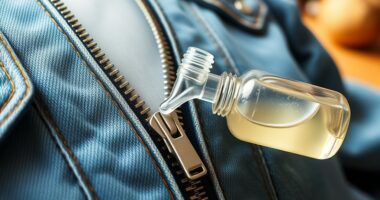When choosing a leather conditioner, avoid ingredients like harsh synthetic chemicals, solvents, alcohol, and artificial fragrances that can damage the leather’s natural oils and cause dryness or cracking. Stay away from petroleum distillates and silicone, as they can create a barrier hindering breathability. Using products with these chemicals may lead to long-term damage and allergic reactions. Keep your leather safe and healthy—learn more about safer options ahead.
Key Takeaways
- Avoid synthetic chemicals like petroleum distillates, silicone, and artificial fragrances that can harm leather and reduce breathability.
- Steer clear of harsh solvents and alcohol-based ingredients that strip natural oils and cause dryness or cracking.
- Stay away from chemicals that create a barrier, preventing leather from breathing and leading to long-term deterioration.
- Don’t use conditioners with substances that can stain or darken lighter leather shades over time.
- Be cautious of products with artificial fragrances or dyes, which may trigger skin sensitivities or allergic reactions.

Ever wondered what goes into a good leather conditioner? The truth is, understanding the ingredients can help you choose products that protect and preserve your leather without causing damage. Many conditioners on the market contain a mix of natural oils and synthetic chemicals, but not all are good for your leather. Natural oils, like mink oil, coconut oil, or neatsfoot oil, can penetrate the leather fibers, offering deep conditioning and helping to restore suppleness. These oils are often preferred because they’re derived from natural sources and tend to be gentle, nourishing your leather without stripping away its natural moisture. However, it’s important to use them sparingly and ensure they’re suitable for your specific type of leather, as some oils can darken or stain lighter shades over time.
Additionally, proper application techniques are essential to avoid over-conditioning or uneven results. On the other hand, synthetic chemicals are common in many commercial leather conditioners, but they’re not always your leather’s best friend. Ingredients like petroleum distillates, silicone, or artificial fragrances may give your leather a shiny appearance initially, but they can create a barrier that prevents the leather from breathing properly. Over time, this can lead to drying, cracking, or deterioration of the material. Additionally, some synthetic chemicals can cause allergic reactions or skin sensitivities, making them less suitable for everyday use, especially if you handle your leather goods frequently.
What you want to avoid are conditioners packed with harsh synthetic chemicals that can compromise your leather’s integrity. These substances often include solvents or alcohol-based ingredients that strip away natural oils and moisture, leaving your leather dry and brittle instead of soft and supple. Many cheap or heavily marketed products rely heavily on these chemicals to make the leather appear glossy or new temporarily, but they usually do more harm than good in the long run. Instead, seek out products that highlight natural oils or are labeled as free from synthetic chemicals. Always read the label carefully and research the ingredients to ensure you’re not unintentionally damaging your leather possessions.
Frequently Asked Questions
Can Natural Ingredients in Leather Conditioners Cause Allergies?
Natural ingredients in leather conditioners can cause allergies or leather sensitivity reactions in some people. You might experience redness, itching, or swelling if you’re sensitive to certain plant extracts or oils. Always check ingredients carefully, especially if you have known natural ingredient allergies. Testing a small patch first helps prevent widespread reactions. If you notice any adverse effects, discontinue use and consult a healthcare professional.
Are Synthetic Fragrances Safe for All Types of Leather?
Synthetic fragrances may smell nice, but they can harm your leather’s durability over time. You might notice that these fragrances cause discoloration or cracking, especially on sensitive or older leather. While some leathers tolerate synthetic scents better, it’s safer to select conditioners without synthetic fragrances to preserve your leather’s quality. Always check labels and opt for fragrance-free options to ensure your leather stays durable and looking its best.
How Long Do Harmful Chemicals Stay on Leather Surfaces?
Many believe harmful chemicals quickly fade from leather, but that’s not always true. Chemical residue can linger on the surface for days or even weeks, depending on the product used and the leather’s porosity. You should know that surface absorption varies, meaning some chemicals may penetrate deeper, making them harder to remove. Regular cleaning and choosing gentle, non-toxic products help reduce chemical residue and protect your leather’s longevity.
Do Eco-Friendly Conditioners Contain Any Undisclosed Chemicals?
You wonder if eco-friendly conditioners hide undisclosed chemicals. Generally, vegan alternatives prioritize ingredient transparency, so brands tend to list all components openly. However, it’s wise to check labels carefully, as some products may still contain undisclosed additives. By choosing brands committed to honesty, you can confidently avoid hidden chemicals, ensuring your leather stays safe and eco-conscious. Always research and select conditioners from reputable sources to guarantee ingredient transparency.
Can Certain Ingredients Weaken or Damage Leather Over Time?
Certain ingredients in leather conditioners can weaken or damage leather over time. You might notice leather aging faster or experiencing ingredient degradation, which compromises its durability and appearance. Harsh chemicals like alcohol or petroleum-based products can strip natural oils, leading to cracks or dryness. Always choose conditioners with gentle, natural ingredients to preserve your leather’s integrity and prevent long-term damage, ensuring it stays supple and beautiful for years to come.
Conclusion
So, next time you pick a leather conditioner, remember: those shiny, chemical-laden bottles promising miracle cures might actually be doing more harm than good. Ironically, what’s marketed as “nourishing” could be slowly stripping away your leather’s soul. Sometimes, the best care is simple—skip the questionable ingredients and embrace natural solutions. After all, your leather deserves love, not a chemical cocktail disguised as protection. Who knew that avoiding certain ingredients could be the secret to truly lasting leather?










